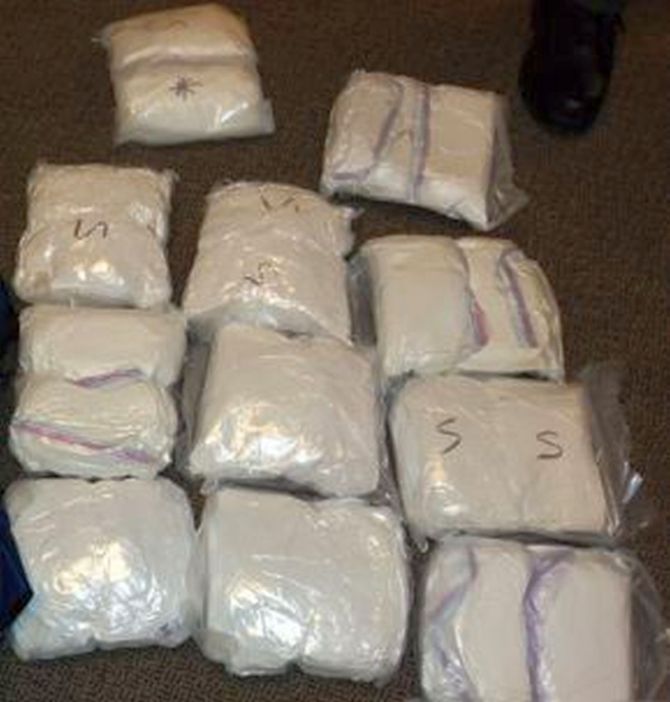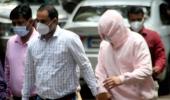The Narcotics Control Bureau on Tuesday claimed to have busted the "biggest" darknet-based LSD cartel operating in India with the seizure of more than 13,000 blots and Rs 26 lakh in cash and the arrest of three persons.

The cartel named 'Zambada' has a "high volume of business and supply chain" of this hallucinogenic category of drug and is also operating in the UK, the US, South Africa, Canada, Russia, Spain, Portugal, Greece and Turkiye, NCB deputy director general (operations and enforcement) Gyaneshwar Singh said.
The cartel was being operated by young educated men in the age bracket of 21-25 years, he said.
It is the second LSD trafficking cartel busted by the agency in the last about three months, officials said.
The federal anti-narcotics agency had seized a cache of 15,000 LSD blots, the highest-ever catch in one operation, and arrested half-a-dozen people in June.
LSD or lysergic acid diethylamide is a synthetic chemical based-drug and is categorised as a hallucinogen. It is abused largely by youngsters and its consumption can lead to serious health issues. It is odourless, colourless and tasteless and it is painted on small squares of paper (blots) that can be licked or swallowed.
In continued operations, it was learnt that the largest cartel operating in LSD on the darknet – Zambada -- operates from Delhi-NCR, Singh said.
Two of the ground operators of this cartel were identified through technical and human surveillance and this led to the location of the "mastermind" of this cartel who was operating from Ballabgarh (Faridabad) in Haryana, he said.
The NCB Delhi zonal office conducted multiple raids at the premises of these three persons leading to the seizure of 13,863 LSD blots, 428 grams MDMA (ecstasy), and the freezing of Rs 26.73 lakh "drug money", agency officials said.
The 'Zambada' cartel, according to the agency, was the "only" cartel in the country with a so-called "5-star rating".
In a statement, the NCB said the drug cartels on the darknet are rated on a scale of 1-5 stars based on the potency of the drug sold through their platform and their "customer service".
Darknet refers to the deep hidden internet platform that is used for narcotics sale, exchange of pornographic content and other illegal activities by using the secret alleys of the Onion router (ToR) to stay away from surveillance by law enforcement agencies.
The NCB said the cartel's name is derived from ‘Ismael-Marlo Zambada Garcia’, a Mexican drug lord, and he was the last remaining fugitive on the list of Mexico's 37 most wanted drug criminals.
He carries a reward of up to USD 15,000,000, the agency said. The first time the name of this cartel was reported in the country was in September 2022 when the Hyderabad police arrested eight people for drug trafficking using the darknet.
Garcia, according to the NCB, declared on the darknet after this interdiction in India that he was safe and will never be caught.
Garcia is stated to be in "close contact" with a darknet operator called Dr Seuss alias DS and TS (Tribe Seuss) or Gamma Goblin -- who is the largest source of LSD across the globe.
'Zambada' intended to open an Indian "outlet" of Dr Seuss with a minimum stock of one lakh LSD blots.
It has "outlets" in the UK, USA, South Africa, Canada, Russia, Spain, Portugal, Greece and Turkiye, according to DDG Singh.
"He (Dr Seuss) had already started recruiting people for this purpose and had put in place the logistics and space," the NCB officer said.
The NCB said it is working to unearth the third such known LSD cartel operating in the country. As part of the two earlier busts, it has registered a total of six cases in Delhi under the provisions of the Narcotic Drugs and Psychotropic Substances Act (NDPS) leading to the arrest of 22 Indians till now.
The two operations led to a total seizure of 29,013 LSD blots and 472 gm of MDMA powder and the freezing of Rs.51.38 lakh cash or "drug money".
These cartels collect money in various crypto wallets and then transfer it across through various layers of virtual currencies and finally receive the money in their bank accounts, an NCB officer said.











 © 2025
© 2025